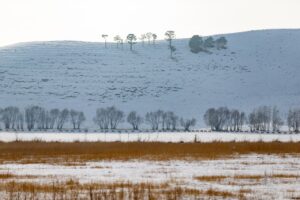Several livestock farmers in Parwan province say that climate change and their lack of knowledge about coping strategies for its impacts have caused significant harm to them.
Gul Padeshah Jalili, a livestock farmer in Parwan, shares that in recent years, due to droughts and the destruction of grazing lands, he has been forced to sell part of his livestock. He adds, “When there is no rain, there is no grass, and livestock owners suffer. The situation needs attention, and we need to be provided with feed that can help increase the milk production of our cows.”
Another livestock farmer, Sohrab, says that due to climate change and reduced income, he is struggling to meet his basic needs. “Drought has destroyed the grazing fields. When there are no pastures, livestock owners face difficulties in providing feed for their animals. With this situation, we are forced to give up livestock farming.”
These farmers call on the Parwan Directorate of Agriculture, Irrigation, and Livestock to offer sustainable solutions to reduce the vulnerability of the livestock sector to the impacts of climate change.
Afghanistan is the sixth most vulnerable country to climate change, and these changes are causing an annual loss of $280 million to the country’s agricultural and livestock sectors.
Niaz Mohammad Tayeb, the Agricultural Affairs Officer at the Parwan Directorate of Agriculture, Irrigation, and Livestock, says that the directorate has implemented programs to mitigate the impacts of climate change.
“We are in contact with partner organizations to resolve the farmers’ issues. In 2022 and 2023, several tons of feed were distributed to livestock farmers through the Norway project. Additionally, our technical teams are ready to provide consultations to the farmers,” Tayed told Salam Watandar.
Mahmoodullah Rasekh, a university professor and livestock affairs expert, believes that managing water resources, water storage, and providing technical advice to farmers can reduce the impacts of climate change.
“The lack of specialized teams, short- and long-term training courses, and insufficient emergency resources has worsened the situation for farmers. Alternative resources to supply animal feed during critical times must be considered.”
Agriculture and livestock farming are among Afghanistan’s most vital economic sectors, with about 75% of families relying on these industries for both food and non-food needs.






